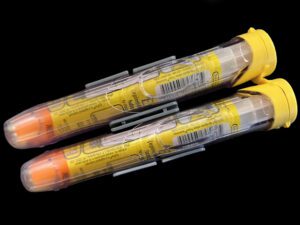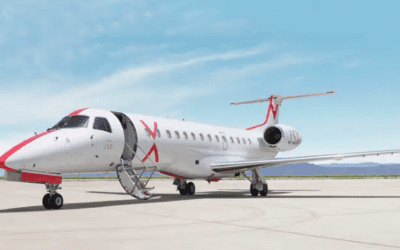The FAA’s lack of a requirement for EpiPens on planes emergency medical kits puts passengers’ lives at serious risk.

About two hours into a July 2019 Delta flight from New York’s JFK airport to Tel Aviv’s Ben Gurion airport, a passenger told a flight attendant that his hands were swelling and that he didn’t feel well. The passenger was quickly going into anaphylactic shock. The flight attendant immediately asked if there were any doctors on board.
While the plane was carrying syringes with needles and life-saving epinephrine in its emergency medical kit (EMK), the medication was in the form of vials of the drug. The plane had no EpiPens to easily self-inject the epinephrine in the right place with the correct dosage.
A doctor, fortunately, identified himself on the flight as the passenger felt his throat starting to close. The doctor chose an appropriate dosage level for the passenger and administered it to his leg, the best available spot. The epinephrine did its work well. The doctor monitored the passenger’s vitals for the almost 11-hour flight. The passenger’s life was saved.
While the FAA requires US airlines to have epinephrine in EMKs, not requiring epinephrine in auto-injectors puts passenger lives at risk.

Eventually, in my opinion, that choice will likely result in a fatality. Most people have no idea how to determine the right dose of epinephrine and where to administer it with a syringe and needle to treat anaphylaxis.
The threat of anaphylaxis on airplane flights is not abstract or theoretical.
The threat of anaphylaxis on airplane flights is not abstract or theoretical. Food allergy in the U.S. is considered a public health crisis by many experts in the medical community. According to FARE (Food Allergy Research & Education), a non-profit, private organization dedicated to food allergy awareness, research, education, and advocacy, more than 32 million Americans, almost ten percent of the U.S. population, are affected by food allergies. Each year in the U.S., 200,000 people require emergency medical care for allergic reactions to food, according to FARE.
Please make no mistake about it — anaphylaxis is a severe, potentially life-threatening allergic reaction. It can occur within seconds or minutes of exposure to something one is allergic to.
According to the Mayo Clinic,
“Anaphylaxis causes the immune system to release a flood of chemicals that can cause you to go into shock — blood pressure drops suddenly and the airways narrow, blocking breathing. Signs and symptoms include a rapid, weak pulse; a skin rash; and nausea and vomiting.”
Anaphylaxis requires an injection of epinephrine to treat it, with a follow-up examination by a physician. On planes today, without a doctor on board, the vials of epinephrine carried in the EMKs are worthless. The FAA needs to understand that and update its EMK requirements.
The FAA should require two 2-paks of EpiPens or suitable substitute auto-injectors on every plane of U.S. airlines.
The time is long overdue for the FAA to require a minimum of two EpiPen 2–Paks or other suitable epinephrine auto-injectors on every plane of scheduled U.S. airlines.
The 2019 Delta flight is hardly an isolated case.
Just last week, a Brigham and Women’s Hospital resident was traveling on Southwest Airlines from Phoenix, Arizona, to Austin, Texas. In flight, she realized she was developing sudden anaphylaxis for the first time. She had hives and felt short of breath. Soon, she felt her throat closing. She paged the flight attendant, who told her they didn’t have any EpiPens but had epinephrine vials. Fortunately, there was a doctor on board who administered just enough epinephrine to keep her stable until the plane could be met by EMS personnel about a half hour later.
After recovering, the passenger, Lindsey Ulin, tweeted,
“Hi, @SouthwestAir I almost died on your flight after developing anaphylaxis for the first time since you don’t carry EpiPens in your emergency kits and no one on the plane had one either.”
The time has come for the FAA to change its policy on epinephrine in EMKs.
Ms. Ulin is calling for a policy change to require EpiPens on planes. I quite agree.
Last year, I wrote about my personal experience with in-flight anaphylaxis. While flying over the Atlantic, my breathing became labored soon after dinner. I don’t know what was in the food that triggered the anaphylaxis. Fortunately, I always carry at least two EpiPens when traveling because I have numerous serious allergies. At the time of the incident, I carried an Ana-kit, an EpiPen predecessor. I self-injected the epinephrine and was soon alright. Even so, as recommended, I saw a doctor soon after landing.
Since 1986, the FAA has mandated that all domestic passenger airplanes with a flight attendant have an EMK containing, at a minimum, specific medications and devices. The FAA also requires airlines to ensure that each crew member receives training for in-flight medical events.
While airline crew members have first aid and aviation medicine training, they cannot inject epinephrine into passengers suffering from anaphylaxis.

While crew members have first aid and some aviation medicine training, they are highly limited in what they may do medically. For example, they may not administer many medications in the EMK. In a medical emergency, they can ask if a doctor is on board. If there is, they must check their credentials, and if satisfactory, allow them to administer the medications. The flight crew may, in some cases, get permission to administer medication themselves, from ground-based medical staff, via cockpit communications.
Unfortunately, for some air travelers, even with the medication they need on board, by the time they can find a doctor on the plane, or get permission from the ground to use the medication, it could be too late.
The FAA has periodically updated the required EMK contents but not the epinephrine requirement.
The required contents of the EMK have been periodically updated. For example, since 2003, the FAA has required all airlines to carry epinephrine in their EMKs, but EpiPens or any auto-injector system of epinephrine aren’t required.
That didn’t affect me on my flight because I brought my supply of epinephrine and continue to do so. I do that because I know I have several severe allergies, many of which can cause anaphylaxis. More often than not, however, people like those air travelers in my two examples aren’t aware of their medical conditions, which could cause anaphylaxis. Therefore, they’re unprepared if the life-threatening condition occurs.
Air travelers’ lives are at stake, and vials of epinephrine are not a viable substitute for epinephrine auto-injectors.
Air travelers’ lives are at stake, and vials of epinephrine are not a viable substitute for epinephrine auto-injectors. The time is long overdue for the FAA to require a minimum of two EpiPen 2–paks or other suitable epinephrine auto-injectors on every plane of scheduled U.S. airlines.
I call upon the FAA to immediately start their process to require epinephrine auto-injectors in EMKs. Since epinephrine auto-injectors are already permitted, while we wait for the FAA to require them, I call upon all U.S. airlines to voluntarily put them into every one of their aircraft immediately. Lives are at risk unnecessarily. The time for the FAA and the airlines to act on this critical issue is long overdue.
In addition, if you have known food allergies or other serious allergies, travel with your EpiPens to ensure you’ll be able to be treated in case of anaphylaxis.

READ ALSO:
Southwest helps storm-delayed passengers during the winter holidays.
Safe Fees, nothing but Hotel Resort Fees by another name
After many years working in corporate America as a chemical engineer, executive and eventually CFO of a multinational manufacturer, Ned founded a tech consulting company and later restarted NSL Photography, his photography business. Before entering the corporate world, Ned worked as a Public Health Engineer for the Philadelphia Department of Public Health. As a well known corporate, travel and wildlife photographer, Ned travels the world writing about travel and photography, as well as running photography workshops, seminars and photowalks. Visit Ned’s Photography Blog and Galleries.



